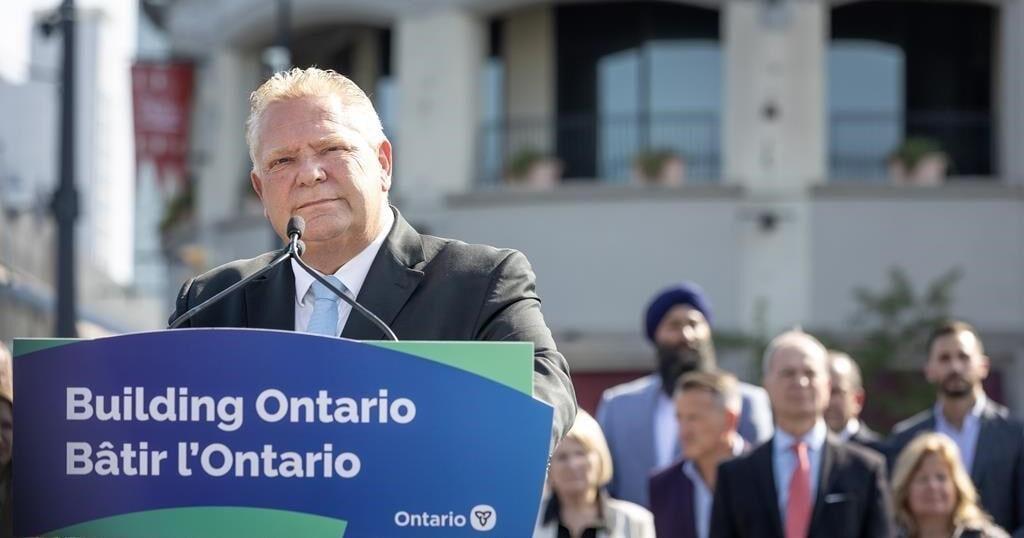TORONTO – One of the largest factors standing in the way of Ontario being able to speed up critical infrastructure projects is a sense of public distrust fostered by the government’s own history with the Greenbelt, polling commissioned by the government suggests.
Leger conducted an online survey about infrastructure in mid-to-late December and held focus groups in January. The Greenbelt was frequently cited, more than a year after media reports first raised questions about government ties to developers and several months after the release of two legislative officers’ scathing reports.
Both the auditor general and the integrity commissioner found that the government’s process to remove 15 parcels of land from the Greenbelt to build 50,000 homes favoured certain developers.
The integrity commissioner found that then-Municipal Affairs and Housing Minister Steve Clark, who resigned after the report was released, violated ethics rules, but said that he had no evidence developers were tipped off about the government’s plans for Greenbelt removals. The auditor general found that the property owners stood to see their land value rise by $8.3 billion
Premier Doug Ford ultimately reversed his decision and returned the parcels of land to the Greenbelt, but the RCMP has launched a criminal investigation.
Leger pollsters said the Greenbelt issue was a “clear example” in participants’ mindsof government overreach and is a “significant” hurdle to getting Ontarians onside with ways to speed up infrastructure.
“The substantial barrier to implementing any mechanism for fast tracking infrastructure projects lies in the current sense of distrust with the government,” Leger wrote in the report on their findings, which the government recently tabled with the legislature.
“Overcoming this, plus some skepticism surrounding motives for expediting projects is crucial for fostering public confidence and facilitating the successful execution (of) initiatives aimed at streamlining processes.”
Green Party Leader Mike Schreiner said it’s unfortunate the government has put itself in this position when Ontario is facing a housing crisis.
“People don’t trust this government to make investments, especially in infrastructure, that put people first instead of the interests of wealthy, well-connected insiders,” he said.
“It’s clear that the Greenbelt scandal and the $8.3 billion that would have gone to a handful of Ford-connected insiders have really undermined the public’s trust and confidence in this government to make investments, especially in housing, that put people first.”
The vast majority of survey respondents agreed that infrastructure is important, in particular hospitals and public transportation. Highways and the redevelopment of Ontario Place, some of Ford’s signature projects, were seen as less of a priority, Leger said.
“Many voiced frustration and opposition to the government’s plans to redevelop Ontario Place,” Leger wrote in its report.
The survey also found regional differences in opinions on infrastructure projects, with central Ontarians less likely to prioritize the speed of approval processes.
“One possible reason for this is central Ontarians are most likely to have formed a negative view on fast tracking due to their experiences surrounding both the Bradford Bypass and the Greenbelt,” said Leger’s report to the government.
Ministerial Zoning Orders, which allow the province to override municipal decisions, have been a key way to speed up some projects and also a point of contention among Ford’s critics. While about half of the survey respondents supported the use of MZOs, with 36 per cent opposed, almost none of the focus group members did.
“Most opposed the use of MZOs, with the view that this can lead to government corruption and the hollowing out of local control on the future of their communities,” Leger wrote in its report.
“The level of recall on the Greenbelt specifically highlights the potential risk associated with utilizing an MZO without proper consultation.”
Grace Lee, a spokesperson for Ford, said in a statement that the government is getting critical infrastructure built.
“From new hospitals, schools, roads, and highways to housing-enabling infrastructure, we are getting it done while working with municipalities and providing them with the tools they need to build more homes faster,” she wrote.
NDP Leader Marit Stiles said it’s no wonder people don’t trust Ford.
“Ford’s constant flip-flopping has created chaos for planners, municipalities, and most importantly – people who are looking for an affordable home,” she wrote in a statement.
Liberal Leader Bonnie Crombie said members of the public question Ford’s motives.
“Doug Ford’s $8.3-billion Greenbelt Giveaway showed he’s not in it for the people of Ontario,” she wrote in a statement.
This report by The Canadian Press was first published Sept. 13, 2024.
